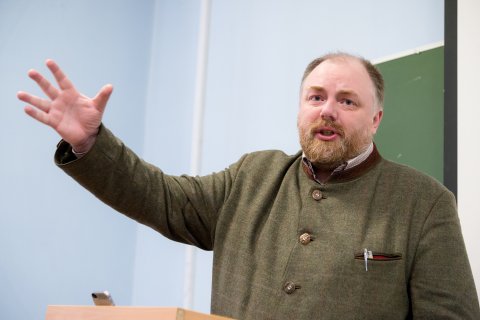A lecture by a famous journalist Egor Kholmogorov took place at South Ural State University. The audience consisted of students of the Institute of Social Sciences and Humanities.
Egor Kholmogorov is a Russian political activist (patriotic right vector), publicist, blogger, Russian nationalist, author and administrator of the 100 Books website, and author of the term “Russian spring”. Egor Kholmogorov has been working as a journalist since 1994: he is the author of a big number of publications dedicated to analytics of current political and religious situation in Russia, philosophy and ideology of conservatism, and to the history of Russian Orthodox Church. Since 2017, Egor Kholmogorov has been an analytic at Tsargrad TV, where he is the host of daily political analytical programme called “Kholmogorov. Results of the Week” as well as a weekly programme called “Movie with Kholmogorov”.
On February 27, the journalist read a lecture to students of the SUSU Institute of Social Sciences and Humanities.
“Making a speech in front of students was very interesting: there was lively feedback of the audience and real, topical, and sometimes even conflicting questions. And we clearly could go on discussing if we weren’t limited in time. I think that students suddenly found out that the image of our Motherland’s history that they know needs significant correction. Perhaps, they took my information as some kind of a challenge, with an interest,” says Egor Kholmogorov.
Topics of the lecture were reign of Nokolay the 2nd and industrialization of Russia. The lecturer explained that he chose these topics because the society has long since needed correcting their views while considering the period of the tsar’s reign.
“Reign of the last tsar had been defamed not only in regard with the false image of his personality that had been created by liberal and communist propaganda, but also in the fact that many of his achievements had been intentionally appropriated by communists. A false image had been created: according to it, the Tsar was not capable of anything, and everything good that had been done was the achievement of his advisors (why did they fight autocracy then?). Many of his achievements like industrialization and electrification had been appropriated by the following authorities. At that, in the basis of school books of my generation were comparative tables dated 1913 and 1933; they were intended for us to see that results of the first five-year period were better. At that, however, the textbooks successfully skipped the fact that if there was no revolution, civil war, starvation and other major disruption, the country would have developed nicely over these 20 years. Results of this balanced development would be much more impressive than the revolutionary failure and the following cramping attempts to catch up. The basis of our industrial might had been laid precisely during the Tsar’s reign, and Soviet’s government in its industrialization had succeeded, first of all, in places where it relied on this historical foundation,” said the lector.
One of the attendees was student of the Institute of Social Sciences and Humanities, Vyacheslav Upolovnev, who shared his emotions: “Egor Kholmogorov is a very confident speaker, and even the most sophisticated audience members liked his lecture. It was interesting to watch him manipulating with facts. I’d like to learn specificity of the profession directly from a professional, so I hope that we will have similar meetings with such professionals again.”
Let us note that South Ural State University is a useful discussion venue. Famous authoritative people who form the intellectual image of Russia deliver speeches here. By taking part in such meetings, SUSU students acquire useful experience which is going to come in handy in their professional activity.




